The Swiss mediator you’ve never heard of
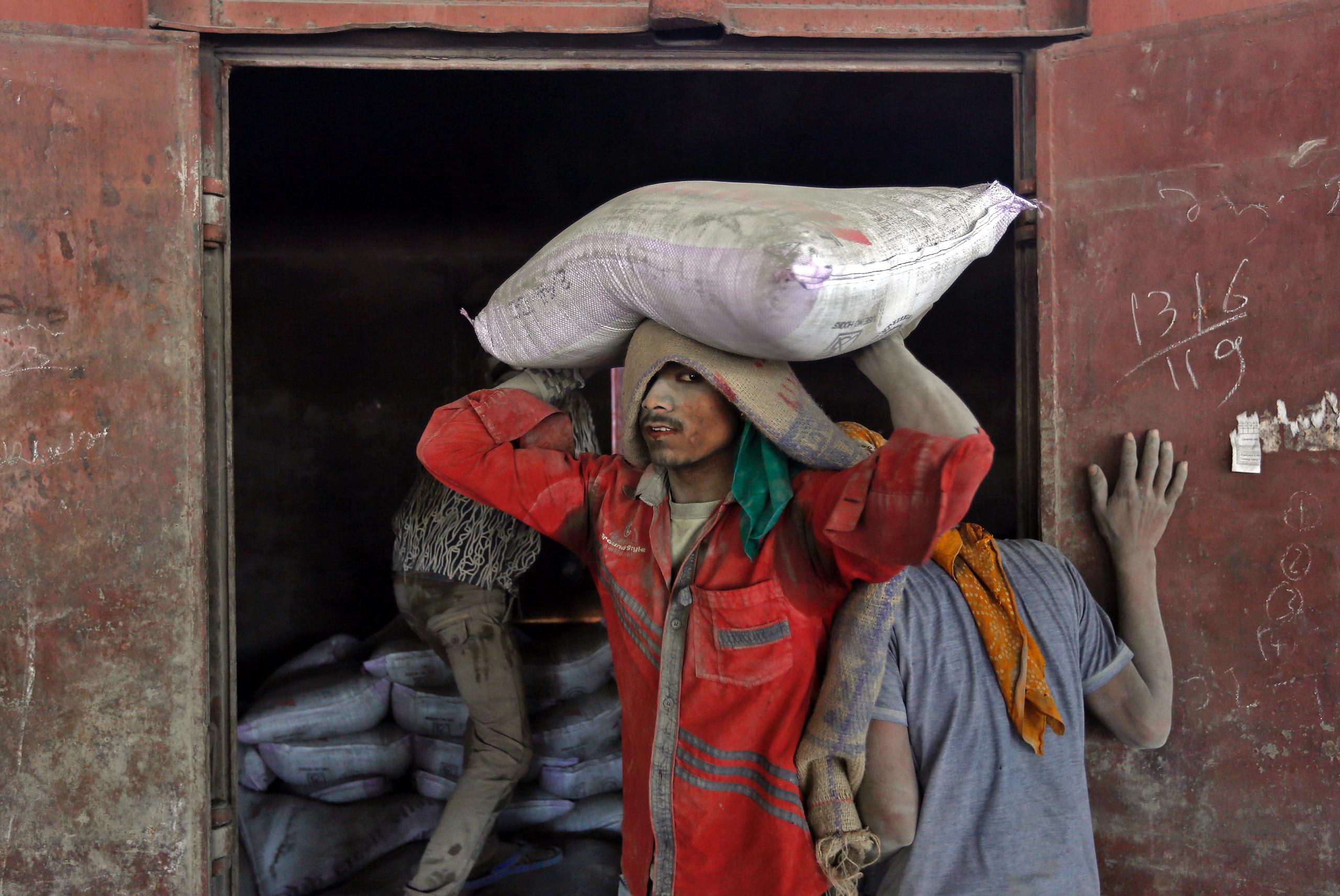
The media or courts are the usual resort of those affected by Swiss-based multinationals like Holcim that violate regulations abroad. But there is another option to bring Swiss companies to the negotiating table.
Raj Kumar Sahu is a worried man. The skinny contract labourer from Jamul in the Indian state of Chhattisgarh wants answers from the Swiss cement giant Holcim (part of the LafargeHolcim group) that owns the cement plant he works for. A new cement plant is being built nearby and Sahu is unsure if he will have a job once it is ready.
But he is not just worried for himself and his family. As vice president of the union Pragatisheel Cement Shramik Sangh (PCSS) he is also responsible for looking after the welfare of hundreds of contract labourers working at the cement plant.
“We want to know what will happen to the 900 workers at the old plant once the new plant under construction is operational,” he told swissinfo.ch. “We also want to know how many workers will be employed at the new plant.”
Sahu and his union PCSS have taken on Holcim’s Indian cement subsidiaries in Indian courts and labour tribunals to fight against the precarious conditions of temporary contract labourers who work there. They earn substantially lower wages than permanent workers and lack job security. PCSS also accuses Holcim’s plants of illegally running their operations using temporary workers to avoid having to employ permanent workers at almost three times their wages.
Frustrated by a lack of progress from Holcim’s Indian management, PCSS took their complaint to the Bern-based Swiss National Contact PointExternal link (NCP) of the OECD (a group of rich countries that Switzerland is a member of). The NCP serves as a sort of ombudsman mediating when Swiss companies are accused of violating a set of responsible business guidelinesExternal link on human rights, environment, corruption and labour relations.
Let’s talk
“The main advantage we offer is an informal and open process where anyone can submit a case concerning a Swiss-based multinational enterprise,” says Lukas Siegenthaler, head of the Swiss NCP. “Our intervention is free of cost and is a good way to engage in a dialogue with a Swiss company.”
All an affected community has to do is submit a written complaint citing which of the OECD guidelines have been violated by a Swiss company abroad.
The Swiss NCP is one of the busiest because of the large number of multinationals based in the country. Unlike courts, participation in the mediation process is voluntary with the main objective being to get both parties to start a dialogue with each other. In the Indian case, the Swiss NCP managed to get Holcim’s top management in a room with PCSS in Bern to find a solution to the contract worker problem.
“Prior to the Swiss NCP mediation there were no negotiations with Holcim,” says PCSS lawyer Sudha Bharadwaj. “After the matter went to the NCP, the company at the highest level was forced to recognise our union and enter into negotiations.”
Sahu, who also travelled to Bern for the mediation, acknowledged the role of the Swiss NCP in providing his union access to Holcim’s senior management. Until then the Indian management had stonewalled any attempt at negotiation.
“Only after complaining to the NCP was Holcim ready to talk to us,” he says. “Before that they thought nothing of us.”
Having a Swiss-based mediation body to oversee discussions also suited Holcim. Prior to the NCP mediation meetings interactions between the two parties had largely been confrontational.
“We welcome the opportunity to exchange on the matters of concern facilitated by an independent institution as the NCP,” Holcim spokesperson Peter Stopfer told swissinfo.ch. “Their facilitation is professional, fair and neutral.”
Siegenthaler shares that even though the process is voluntary, so far no Swiss company has refused to participate in the informal mediation process.
“It is also in the interest of the multinational because we try to provide a platform to resolve problems,” he says. “Otherwise they could be attacked in public and face reputational risks.”
The Swiss NCP’s role is also not just limited to Swiss companies. Recently, it was decided that cases against international sporting bodies based in Switzerland could also be brought to the NCP, provided they are involved in commercial activities.
“The OECD guidelines could apply to sports associations and sporting events and we are open to receive submissions about bodies like FIFA,” says Siegenthaler.
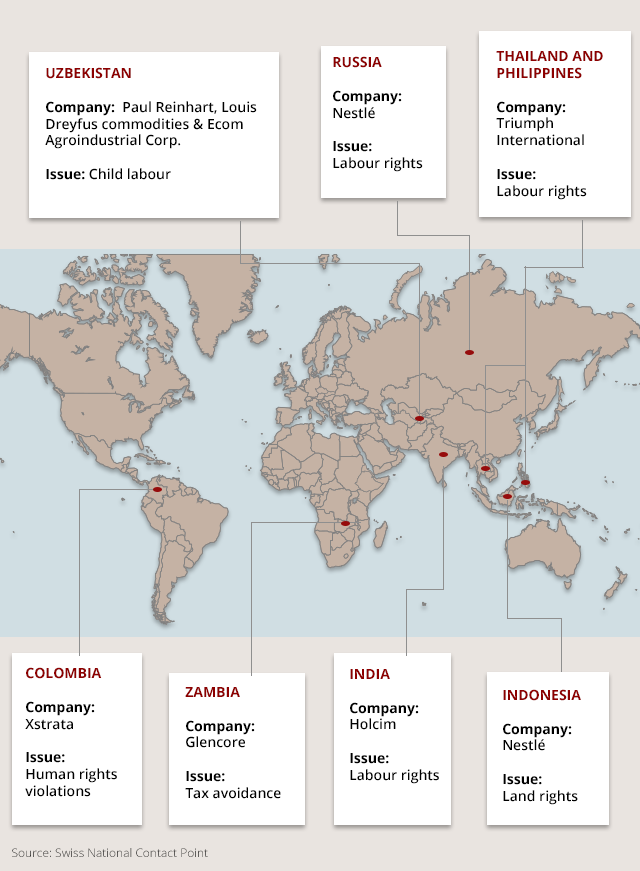
Limitations
In what is usually a battle between David and Goliath, concerns have been raised about a level playing field. Small groups like PCSS have to come to Bern for the mediation meetings which requires a lot of resources. Their travel and accommodation expenses are not covered by the NCP and they are forced to raise the funds themselves. PCSS luckily managed to get financial support from international labour unions IndustriALL and Unia.
“For contract workers who earn $2 a day, an air ticket from India to Zurich is a real obstacle,” says Matthias Hartwich of IndustriALL Global Union. “By pure coincidence PCSS were affiliated to IndustriALL otherwise we would not have been able to help them with travel costs.”
According to Siegenthaler, so far complainants have always managed to find the funds to travel to Switzerland. But he acknowledges that this is a problem that needs fixing.
“NCPs are not in a position to cover such costs but in exceptional cases we could do so,” he says. “If we are approached by a party and they really have serious problems meeting the costs we can see what can be done.”
Another limitation of the NCP is that it can only bring two opposing parties together but cannot guarantee that the conflict will be resolved. The Holcim labour dispute in India is still ongoing despite almost three years since the case was brought to its notice. PCSS is not satisfied with the result of the mediation.
“There was no real agreement and the Holcim management did not give a straightforward answer to our questions,” says Sahu. “Even though we got to talk to Holcim, we feel that the NCP did not apply enough pressure on them to arrive at an outcome.”
Hartwich of IndustriALL who was also present during one of the mediation meetings agrees that the Swiss NCP struggled to come up with a proposal for resolving the conflict that was acceptable to both sides. He contrasts this with a similar type of dispute between Heidelberg Cement and Indonesian trade unions that was mediated by the German NCP.
“We really ended up with a joint statement there,” he says. “At the end of the mediation both parties shook hands and were grinning with happiness because they had solved the problem.”
Siegenthaler acknowledges that the Indian case was a tough one for the Swiss NCP but insists that progress has been made towards resolving the dispute.
“A successful outcome depends on flexibility on both sides, whether they are really willing to have an open dialogue,” he says. “Ideally we bring the parties to together and they continue the dialogue at the national level afterwards.”
Responsible business initiative
The voluntary and non-binding nature of corporate social responsibility and due diligence measures is what exasperates human rights groups and environmental activists. The Swiss government has refused to introduce mandatory measures for businesses and parliament narrowly rejected a motion in March for mandatory human rights due diligence. But things could change.
In April, a group of 66 civil society groups launched the responsible business Initiative that aims to make due diligence by Swiss multinationals mandatory to ensure that human rights and environmental regulations are respected abroad. If the initiative is accepted by popular vote, aggrieved parties anywhere in the world can bring Swiss companies to Swiss courts for failure to identify potential risks to people and environment.
Holcim is not in favour of such legislation. The company prefers instead to rely on its own human rights due diligence programmeExternal link that it has been implementing since 2013.
“The new company LafargeHolcim shares the position of many Swiss companies and industry associations that new laws are not the best way to solve complicated problems on the ground,” says company spokesperson Stopfer. “We are convinced that collaboration with partners from all sectors to find solutions for concrete local dilemma is the most adequate solution.”
But not everyone agrees. Hartwich of IndustriALL Global Union thinks that legal repercussions would be complementary to informal mediation.
“More and more decisions are taken at the company headquarters and executed elsewhere,” he says. “So more accountability of headquarters might be necessary.”

In compliance with the JTI standards
More: SWI swissinfo.ch certified by the Journalism Trust Initiative

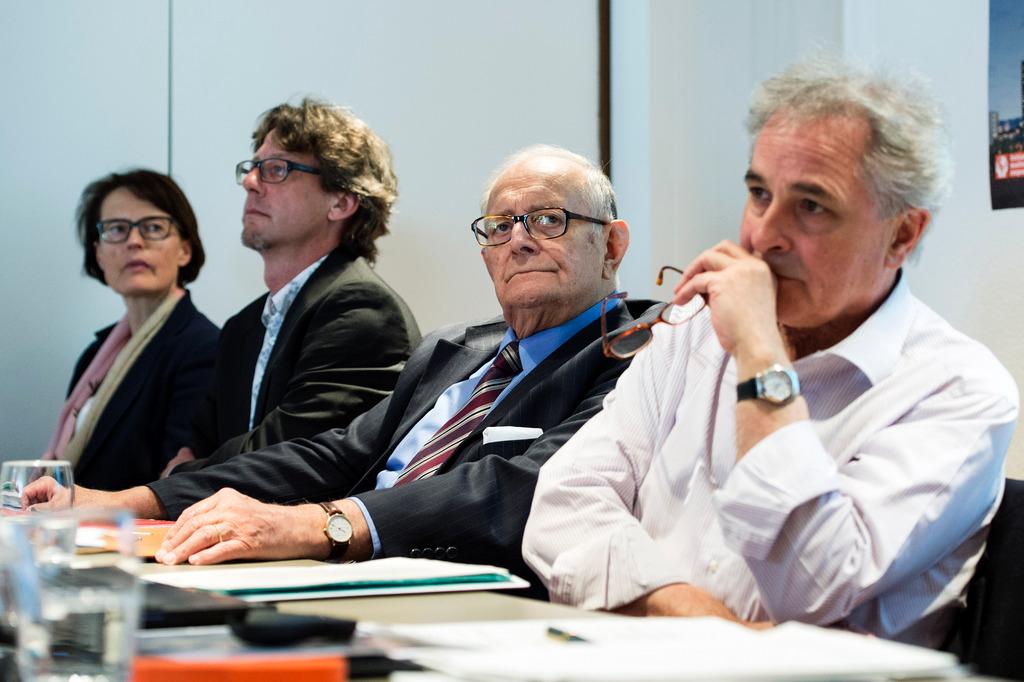
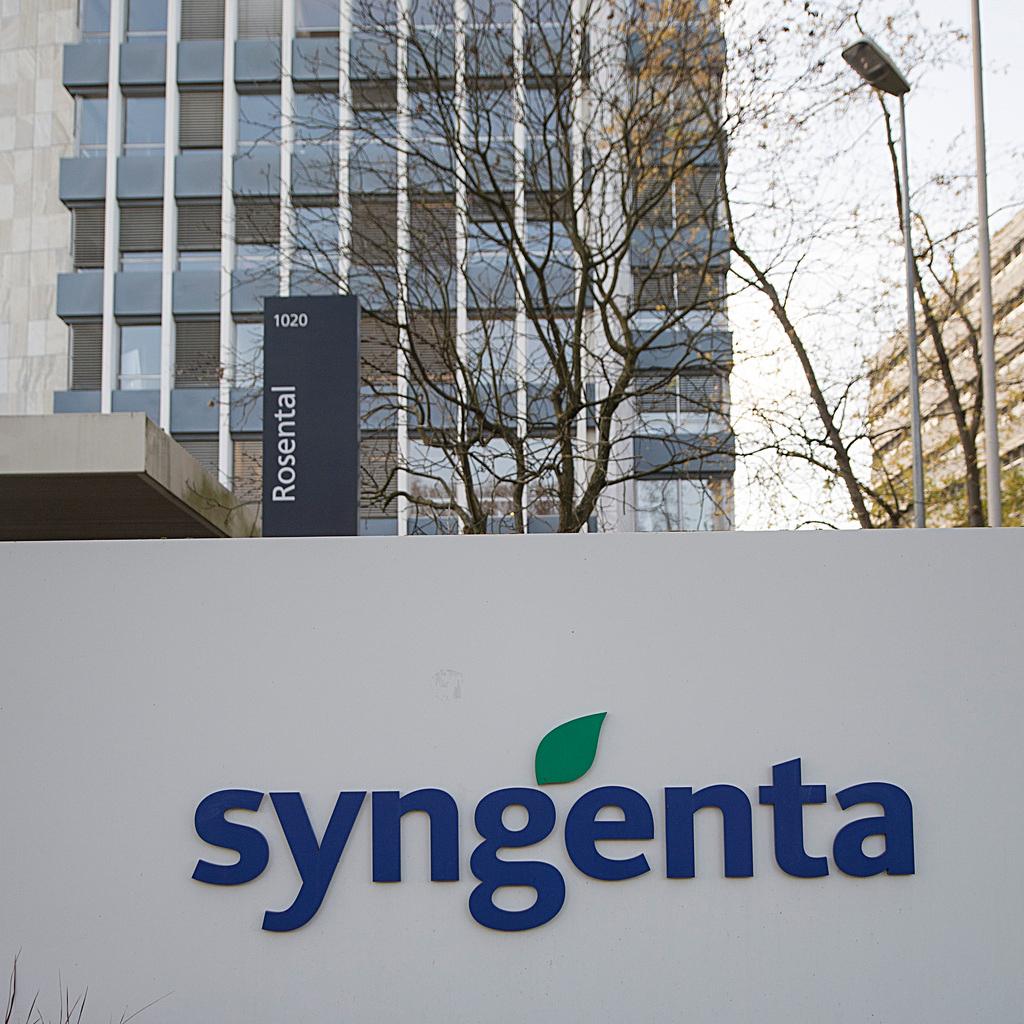

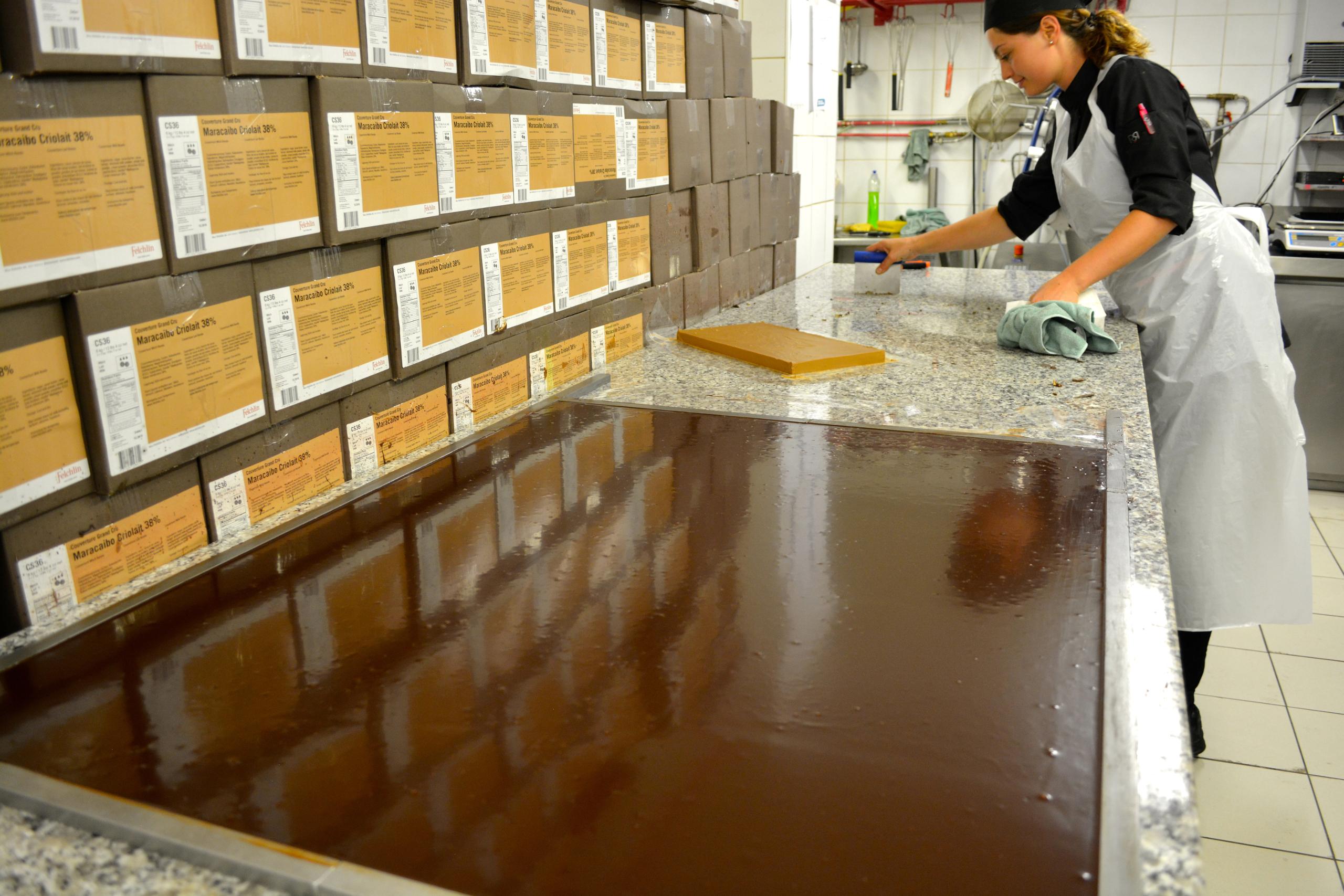
You can find an overview of ongoing debates with our journalists here. Please join us!
If you want to start a conversation about a topic raised in this article or want to report factual errors, email us at english@swissinfo.ch.